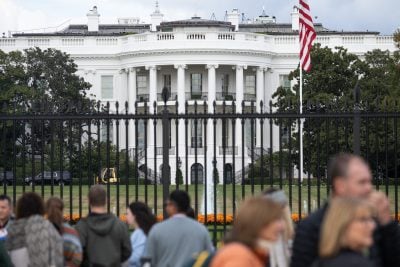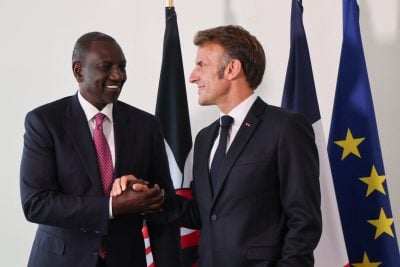Almost two years since trading commenced under the African Continental Free Trade Area (AfCFTA), signed by 44 of the African Union’s 55 member states, the United States’ commitment to the project is being questioned.
With crucial negotiations for the trade area’s implementation still underway, the US insisted in its August US Strategy Towards Sub-Saharan Africa document that it “will support the AfCFTA’s implementation.”
But while the US has provided technical support in the form of workshops and programs, for example on digital trade negotiations and policy frameworks, there’s no evidence of US funding for activities specifically supporting the AfCFTA’s development and implementation, according to an August report by the Congressional Research Service.
“The US has provided technical support for the AfCFTA under both the Trump and Biden Administrations, but there appears to be no current comprehensive source of data on funding for US activities specifically in support of AfCFTA’s development and implementation,” the policy paper says.
By contrast the EU is a major donor to the initiative, providing approximately $79.9m from 2014-2020, with further assistance ongoing, according to a factsheet on ‘Ongoing EU Support’ for the Africa-EU Partnership and AfCFTA. The EU has also helped facilitate the AfCFTA negotiation process, country ratifications, tariff classification, the development of national implementation strategies and policy frameworks such as intellectual property rights.
The UK meanwhile has also pledged around $45.5m between 2021 and 2026 to support the implementation and intra-regional trade and investment, while Germany provided $37.3m between mid-2020 and mid-2024, as well as assistance with AfCFTA negotiation preparation, implementation, policy research, advice, and stakeholder outreach and training.
Carlos Lopes, professor in the Mandela School of Public Governance at the University of Cape Town and former secretary general of the United Nations Economic Commission for Africa (UNECA), is sceptical that the US is genuinely supportive of the agreement.
“The United States has made no secret that they were completely against the AfCFTA from the very beginning,” he told African Business.
“It claims that it’s not in conformity with WTO [the rules of the World Trade Organisation] and it’s been a struggle.”
The Congressional Research Service paper cautions against the US’ waning influence in shaping global trade rules through the World Trade Organisation, and hints that the US could instead pursue bilateral deals on the continent or agreement with regional blocs.
“Congress may consider how the United States can ensure US trade policy priorities continue to influence the development of new global trade rules, including in Africa. Options to address this concern might include greater US prioritisation of new US trade agreement negotiations with countries or regional blocs in Africa,” it says.
While the US has provided African products with unfettered, duty-free access to its markets through the African Growth and Opportunity Act (AGOA) Africa’s future prosperity depends on the evolution of its value-chains via the AfCFTA, Lopes says.
“What we know for sure is that the real debate isn’t about market access. It’s about creating conditions for value chains in Africa to evolve. And the only way they can evolve is through a number of measures that have to be much more aggressive, including our regional integration.”
Supporting the AfCFTA in word or in deed?
Laird Treiber, a senior associate with the Africa Program at the Center for Strategic and International Studies (CSIS) and former member of the Senior Foreign Service in the State Department, insists that Washington supports the AfCFTA “both in word and in deed”.
“The Biden administration has clarified and extended its predecessors’ support of the most important policy that there is for Africa, that is the African Continental Free Trade Agreement,” he tells African Business.
“They’ve made it clear that there is support not just from DFC (US International Development Finance Corporation) for investment, but from the US Export Import Bank (EXIM), from the US Department of Agriculture, from the Department of Commerce and State,” he says.
With just 17-18% of African trade carried out within the continent, when the AfCFTA goes into full effect: standardising trade procedures and harmonising 90% of tariffs across all the 54 signatories, Treiber says the impact on the development of African markets will be game-changing.
“That’s how you get value chains and manufacturing.”
As countries rethink their supply chains in food, energy, health and consumer goods amid China’s retreat and the Ukraine war, US companies are also being encouraged to take a closer look at the opportunities the new trade area presents, Treiber says.
“The US Trade and Development Agency (USTDA) has looked at infrastructure and regulations. There will be a significant pick-up next year when companies have more confidence that financial and market conditions are where they need to be.
“I think the Biden team have put a lot of tools on the table and have been working with the IMF and regional banks to try and increase confidence and the ability of finance ministries to handle some of the payments issues. And the Biden administration trying to support investment in key areas that would accelerate more jobs and economic growth, like ICT and infrastructure.”
Promising progress
On January 13, 2022, Africa’s trade bloc took a major step towards its objective with the establishment of the Pan-African Payments and Settlements System (PAPSS), which allows transactions among companies operating in Africa to be conducted in any local currency.
This year also marked the first shipment of locally made car batteries and tea from Kenya to Ghana under the AfCFTA’s new zero-tariff rules, as well as the agreement of harmonised investment protocol rules.
Later this month, 45 African heads of state will descend on Washington DC for the three-day African Leaders Summit, designed to make good on the Biden administration’s promises to redefine relations with the Africa amid lagging investment after the disastrous engagement under Trump.
A report by the World Bank anticipates that the AfCFTA could lift 30 million Africans out of extreme poverty, boost the incomes of nearly 70 million people, and generate $450bn in income by 2035.
Want to continue reading? Subscribe today.
You've read all your free articles for this month! Subscribe now to enjoy full access to our content.
Digital Monthly
£8.00 / month
Receive full unlimited access to our articles, opinions, podcasts and more.
Digital Yearly
£70.00 / year
Our best value offer - save £26 and gain access to all of our digital content for an entire year!
 Sign in with Google
Sign in with Google 



